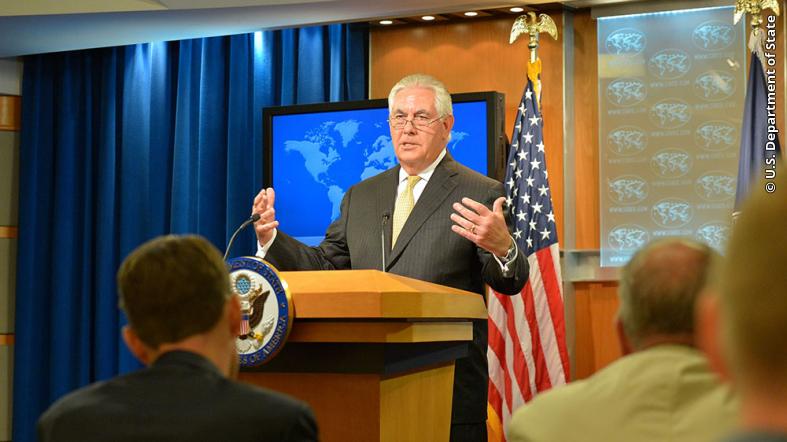 State Department Photo
State Department Photo
America First is not the Great Catchphrase America Needs Abroad
On Tuesday, Secretary of State Rex Tillerson made a rare public appearance in the State Department’s briefing room, addressing reporters on the many challenges the U.S. faces overseas. Including discussions about North Korea, Iran, Russia, Syria and Ukraine, Tillerson covered all the bases.
The secretary made a number of important statements at that briefing, but what truly stands out is his pronouncement that “America first does not mean America alone.”
At first glance, this explanation of America’s new guiding foreign policy principle appears to be an acknowledgement that its allies are important. It appears to acknowledge that foreign publics and governments around the world have taken issue with the “America first” stance. Recent statements soundly and clearly in support of NATO’s Article 5 by Vice President Pence lend to the kind of pronouncements America’s allies have been waiting to hear. But on closer examination, having to include wording like “does not mean” has implications that go far deeper than clarifying meaning of a catch phrase.
America needs a message that inspires abroad. It needs a message that siding with America in the 21st century is the right choice. It needs a message that partnering with the United States brings prosperity, personal empowerment, and a path forward. “America first” does not provide that, and it does not make America great in the eyes of the world. Having to define your policy by explaining what it isn’t is a good sign of a poor message. The Trump Organization has built a successful brand for itself in the business world, but you can’t sell a country the same way you sell a building or licensing rights.
For its own benefit, America needs to sell itself abroad—and to do so, it needs a better message.
Making America great again cannot mean making it great solely in the eyes of its own citizenry or electoral base. That’s simply not tenable in a global economy where America wants to increase its trade balance, export its goods, encourage others to do business with it, attract the best and brightest minds from abroad, and lead the world from the front—not from behind. This is soft power in its most basic form. America needs to inspire people to follow—and not at their own expense—but for their personal benefit. That inspiration is not created by simply explaining why America is great—it must be demonstrated, and it must be felt.
In the meantime, America is ceding the narrative and the message to nefarious actors like Russia and ISIS. The Global Engagement Center (GEC), an interagency office housed in the State Department which has not yet received the $80 million dollars designated for it by Congress. The GEC is one of America’s primary tools in combating ISIS and Russian propaganda, and to deny it the funding it needs to tackle its crucial mission is crippling to America’s message overseas. This is a solvable problem. Secretary Tillerson would be wise to accept the funding and not cede the message to America’s adversaries. America should stand up for its principles, and fight back against the false narratives which plague the global information sphere.





